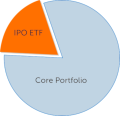The We Company's (WE) senior preferred stockholders receive free shares in the event of an IPO down-round. With rumors of WeWork being valued as low as $10 billion, those free shares could be worth more than $400 million. On page F-115 of the latest prospectus, the company discloses that all Preferred Stock is subject to the following anti-dilution provision:
“The conversion ratio for the Senior Preferred Stock is adjusted on a broad weighted-average basis in the event of an issuance (or deemed issuance) below the applicable Senior Preferred Stock price, as adjusted.”
A weighted-average anti-dilution provision (partial ratchet) grants earlier investors some additional shares in the event of a down-round. That compares to a full ratchet, which provides 100% downside protection, and includes often-cited ratchet examples like Chegg (2013 IPO; $146 million in additional shares), Square (2014; $93 million) and Box (2015; $67 million).
If triggered, weighted-average anti-dilution protections usually result in only a few million dollars worth of extra shares. But in the case of WeWork, because SoftBank’s latest round was so large ($5 billion) and the rumored down-round is so far below the price SoftBank paid, this provision could result in the world’s largest IPO ratchet, granting existing shareholders $200 million to $500 million worth of additional shares, mostly going to SoftBank.
For example, if the company raises at least $3 billion and is valued at a market cap of less than $14.5 billion post-IPO, the total value of the additional shares issued under the provision would be more than $400 million.

So while SoftBank's $5 billion Series G-1 round may realize a loss of more than 75% at the IPO price, the value could actually be about 15-30% higher than it would have been otherwise. And as a result, the founder and employees will see their own shares diluted.
Furthermore, We Co. notes on page II-3 that upon receipt of the remaining $1.5 billion it is owed by SoftBank under the G-1 round, We has agreed to issue SoftBank a warrant exercisable for We stock. However, the terms of the warrant are not disclosed; a significant number of shares with a low exercise price could result in further dilution.
Formula for broad-based weighted-average conversion
Under this provision, the conversion price is adjusted to be equal to the price paid by earlier investors (e.g. $110) multiplied by the ratio of shares that would have been outstanding had the IPO priced at the earlier round (pre-IPO shares + IPO shares if deal priced at $110) and the actual post-IPO shares (pre-IPO shares + actual IPO shares issued in the down-round).
Note: Original article posted on 9/12, removed on 9/13, and re-posted on 9/16 following revisions to the ratchet discussion.


